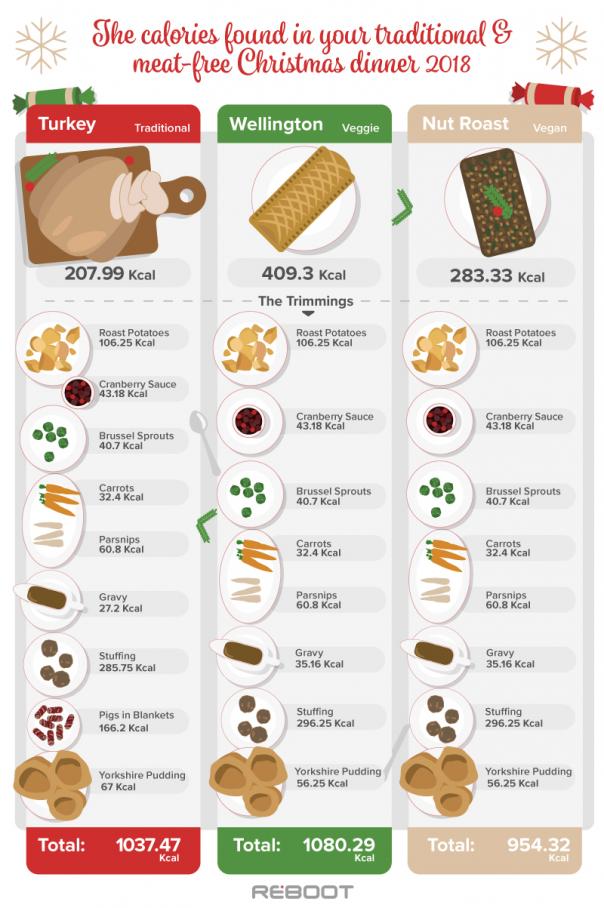
According to a recent report by Waitrose, one in eight Brits are now vegetarian or vegan, whilst 21% identify as ‘flexitarian’, eating a meat-free or meat-reduced diet.
With the rise of the plant-based diets sweeping the globe this year, it comes as no surprise that vegetarian and vegan Christmas dinners are becoming increasingly popular in the UK.
Whilst turkey continues to take centre stage, Tesco’s Christmas report revealed that 27% of hosts are set to cater for an alternative diet at their Christmas dinner table this year.
With that in mind, OnBuy.com decided to take a closer look at the nutritional value of a ‘traditional’ Christmas inner and compare it to vegetarian and vegan-friendly alternatives.
The nutritional information for a ‘traditional’ turkey dinner and the alternatives were calculated by collating the calories, fat, saturates, sugar and salt content of each component of a traditional dinner from four supermarkets: Tesco, Sainsburys, Waitrose and M&S.
The ‘staple’ elements to a classic Christmas roast were identified and those unsuitable for vegetarians and vegans were replaced with alternatives. An average was calculated from all four supermarkets in order to give an indication to the nutritional values per item - a ‘main’, roast potatoes, stuffing, carrots, parsnips, Brussel sprouts, a Yorkshire pudding, cranberry sauce, gravy. And pigs in blankets were chosen for the classic dinner only.
It was discovered that the average ‘traditional’ Christmas dinner with all the trimmings equated to just over 1037kcal – more than half of men and women recommended daily allowance.
Interestingly, the Wellington vegetarian alternative dinner trumped the traditional dinner with a staggering intake of 1080.29 calories, even without a substitute for pigs in blankets.
The Vegan Nut Roast dinner came out on top with the least calories (954.32).
When removing the infamous pigs in blankets from the traditional dinner, it contains just over 871kcal; meaning that three of the nation’s favourite bacon covered sausages, on average equates to 166.2 calories, as well as 12.15g of fat, of which 4.5g are saturates.
However, a Christmas feast without pigs in blankets would mean you were consuming less calories than both the veggie Wellington and vegan Nut Roast alternative dinners.
In terms of fat content, the Wellington vegetarian dinner and all the trimmings, on average, contains the most with 38.62g, of which 13.5g is saturates.
The traditional dinner, surprisingly, comes second with 36.69g of fat, of which a whopping 12.56g is saturated fat. Thereafter, the Nut Roast dinner takes the crown, with the lowest fat content (31.54g of fat, whilst 4.55g are saturates).
When removing the trimmings and solely comparing the ‘main’ element of the festive meal, a portion of the Wellington continues to contain the most calories and fat; just shy of 410kcal and a substantial 22.98g of fat.
A portion of the Nut Roast follows suit with 283.33 calories and 15.9 grams of fat (1.88g of which is saturates). Therefore, the two meat substitutes contain more calories and fat than the recommended portion of turkey.
And for the nation’s favourite - a portion of turkey had the least amount of calories and fat per portion – with 208kcal and 4.68g of fat, of which 1.41g is saturates.